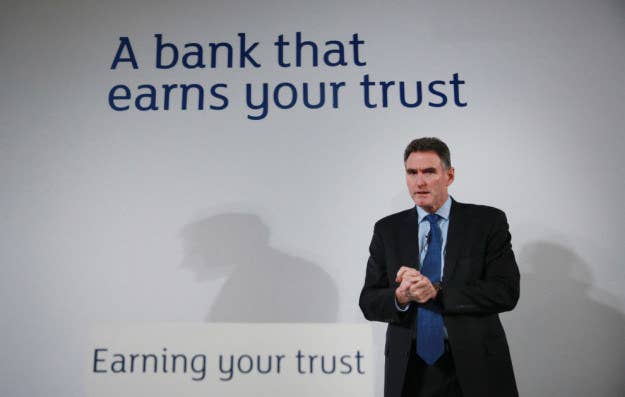
The Financial Conduct Authority has been accused of a “whitewash” after announcing it lacks the power to take action against the Royal Bank of Scotland, despite a three-year investigation that found widespread abuse of small businesses.
The city watchdog announced on Tuesday that its long-delayed inquiry had found evidence of “systematic” mistreatment of small firms by the publicly owned bank’s troubled business division, Global Restructuring Group (GRG), but said its powers to intervene were “limited”.
The FCA statement was timed to coincide with the announcement by RBS of a £400 million compensation scheme, which was immediately branded “wholly inadequate” by victims. Market-sensitive details of the scheme were passed to journalists on Monday night, ahead of the formal announcement, prompting the FCA to demand a leak inquiry at the bank.
The dual announcements come weeks after BuzzFeed News and BBC Newsnight published evidence from a massive cache of leaked documents revealing how GRG drained businesses of cash and stripped their assets as part of a deliberate plan to boost revenues during the recession.
The FCA has been investigating claims that the bank crushed businesses for profit since the allegations were first raised in a damning report by the government adviser Lawrence Tomlinson three years ago. The bank has always strongly denied the claims – but was forced into its first admission that it had "let some customers down" after GRG's secret profit policies were exposed in documents obtained by BuzzFeed News last month.
Ross McEwan, the bank's chief executive, admitted on Tuesday that GRG had put some small businesses through a “traumatic and painful experience” during the financial crisis and said he was "very sorry that we did not provide the level of service and understanding we should have done”.

The bank said it would automatically refund those who were charged unduly complex fees by GRG, and set up a complaints process overseen by Sir William Blackburne, a retired high court judge. But it insisted that there was no evidence that GRG had deliberately driven healthy businesses into distress in order to make a profit.
The FCA said in its statement that it accepted RBS’s compensation scheme, which had been “developed with our involvement”. But it said that, despite evidence of “widespread” mistreatment of small businesses by the bank, its powers were “limited” because “the activities carried out by GRG and addressed by RBS’s proposals are largely unregulated". While retail banking is heavily regulated to protect consumers, there are fewer controls on the services offered to business customers.
The FCA's statement also revealed that its three-year inquiry had examined just 207 cases. The leaked RBS Files showed that 16,000 businesses were forced into GRG during the recession.
MPs and small-business groups reacted furiously to the announcements, accusing the regulator of protecting the bank, which is 73% owned by the government.
John Mann MP, a Labour member of the Treasury select committee, branded the FCA report a “whitewash” and said the compensation on offer was “not going to be sufficient by any means”.
“It’s been done to protect RBS’s share value,” he said. “It’s government looking after government.”
George Kerevan, an SNP member of the committee, said the FCA’s publication of a “highly selective” summary of its findings was “deeply manipulative”. He accused the regulator of “trying to negate the appalling facts regarding the mishandling of small-business customers” and demanded that it hand over a full copy of the report to the committee.
Bill Esterson MP, Labour's shadow minister for small business, said RBS had shown a “despicable disregard for small businesses” and called for “stronger regulation”.
“It’s clear there was a systemic problem at RBS and I rather doubt the compensation set aside is enough for the many businesspeople who lost everything, financially and personally,” he said.
James Hayward, managing director of RGL Management, which is preparing to bring a group action against RBS on behalf of hundreds of businesses next year, dismissed the compensation scheme as “wholly inadequate” and said the group claim would be worth several billion pounds.
Until the revelations by BuzzFeed News and Newsnight last month, RBS had always insisted publicly that GRG acted as an “intensive care unit” for ailing firms, tasked with restructuring their loan agreements to “help them back to health”.
But the FCA statement said its inquiry had found that two-thirds of the firms pushed into RBS's unit for distressed businesses had in fact been “viable” and that “most of them experienced some form of inappropriate action by RBS". This action included the imposition of heavy fees, mishandling of complaints, inaccurate valuations of properties, and inherent conflicts of interest in the acquisition of customer assets by its own property division, West Register.
The report found that these “systematic” failings were caused by a conflict between GRG’s “commercial” objectives to boost the bank’s revenues and its professed aim to help turn struggling businesses around. The mistreatment “resulted from a failure on the part of RBS to fully recognise and manage the conflicts of interest inherent in GRG’s twin commercial and turnaround objectives,” the statement said.
However, the regulator said there was no evidence that the bank had manufactured false reasons to force healthy businesses into GRG with the intention of profiting by distressing them artificially or acquiring their assets. It said the inquiry had concluded that: “In a significant majority of cases, it was likely that inappropriate actions did not result in material financial distress to these customers."
Lawyers and small-business groups said the regulator's claim that small businesses had not been harmed by GRG's unfair fees and asset stripping was "dishonest" and contradicted by internal documents in the leaked RBS Files.
Nikki Turner, director of the Small and Medium-Sized Enterprise Alliance, said: "This flies in the face of what BuzzFeed News and the BBC uncovered ... It's smoke and mirrors and the FCA have given in again to vested interests. They are not impartial."
Hayward, of RGL Management, said: "A lot of RBS's internal documents contradict the key findings of the FCA report ... It is a defence of RBS's actions, which left thousands of families destitute through no fault of their own, other than trusting their bank."
Tomlinson, the former government adviser whose report three years ago triggered the FCA probe, said the regulator's published findings were "very damning" but warned that the proposed compensation scheme "does not address the root of the problem".
"The FCA has found that conflicts of interest in the objectives of GRG were not well governed and oversight did not protect customers," he said. "The consequences of this are significant and refunds of excessive fees alone will not compensate the distress caused to businesses."
The statements were released when markets opened on Tuesday morning, just hours before the head of the FCA, Andrew Bailey, was due to give evidence to MPs on the Treasury select committee (TSC).
Asked why details of the planned compensation scheme had been passed to journalists the night before the official announcement, Bailey told MPs that the leak was "more than disappointing" and promised to hold an inquiry to establish the source of the market-sensitive briefing and ask the RBS to do the same.
“It was always clear to us that this was going to be a market-sensitive announcement and needed to be handled as such, so I was extremely disappointed like you when I saw the evidence of people being pretty comprehensively briefed in advance,” he said.
Andrew Tyrie, chairman of the committee, told BuzzFeed News: "The leak of market-sensitive information is deeply concerning. The FCA confirmed today that they will be conducting a leak inquiry; the TSC will examine its conclusions carefully."
Kerevan, an SNP member of the committee, said: "For the FCA to spring before the Treasury select committee, at a few hours' notice, a highly selective comment on a report into the RBS/GRG scandal that the regulator is trying to avoid publishing in full, is deeply manipulative."
He went on: "The obvious leaking of market-sensitive information about the proposed GRG redress mechanism suggests that somebody with a vested interest was playing the FCA at its own game. The FCA has asked RBS to conduct an inquiry into the leak. I think that suggests where the FCA thinks the blame for this leak lies."
An FCA insider told BuzzFeed News that the regulator had wanted to publish the announcement earlier but RBS had stood in its way. The source said "the intention was to publish a lot sooner" – ahead of Bailey's appearance before Treasury committee – but "there have been negotiations in the last week with RBS that went right to the wire".
RBS declined to comment on the timing of the announcement or the leak allegations.



